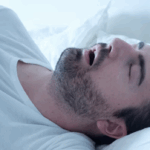
In our increasingly digital world, technology has woven itself into the very fabric of our daily lives. With the prevalence of smartphones, tablets, laptops, and smartwatches, we remain consistently linked. While technology offers numerous benefits, its pervasive presence, particularly before bedtime, can significantly impact the quality of our sleep. In this blog, we’ll explore how technology affects a good night’s sleep and what we can do to mitigate its negative effects.
The Impact of Blue Light
One of the primary ways technology affects sleep is through the emission of blue light. Most electronic devices, including smartphones, tablets, and computer screens, emit blue light. Blue light has been identified as a disruptor of melatonin production, the hormone that governs our sleep-wake patterns.. When melatonin production is disrupted, falling asleep becomes more difficult, and sleep quality can be compromised.
Sleep Disruption from Notifications
The constant stream of notifications from emails, messages, and social media can also contribute to sleep disturbances. The sound or vibration of a notification can interrupt sleep cycles, causing brief awakenings that prevent the deep, restorative sleep necessary for optimal health. Even the anticipation of notifications can create anxiety, making it harder to fall asleep and stay asleep.
Mental Stimulation
Using technology before bedtime can also result in heightened mental arousal. Activities such as browsing the internet, playing video games, or watching videos can keep the brain active and alert when it should be winding down. This heightened state of arousal can delay the onset of sleep and reduce sleep quality.
Social Media and Stress
Specifically, social media platforms can induce feelings of stress and anxiety. Scrolling through news feeds or comparing oneself to others can trigger negative emotions and thoughts that interfere with the ability to relax and fall asleep. Additionally, exposure to distressing news or contentious online discussions can elevate stress levels, further hindering sleep.
Physical Discomfort
Using electronic devices in bed can lead to physical discomfort that impacts sleep. Poor posture while using smartphones or laptops can cause neck and back pain, making it harder to find a comfortable sleeping position. Additionally, the use of devices in bed can create an association between the bed and wakefulness, making it harder to fall asleep.
Strategies to Improve Sleep Quality
Given the significant impact of technology on sleep, it’s important to adopt strategies that can help mitigate these effects. Here are some practical steps to improve sleep quality in our technology-driven world:
1. Limit Screen Time Before Bed
- Aim to stop using electronic devices at least one hour before bedtime. This allows the brain to wind down and prepare for sleep without the interference of blue light or mental stimulation.
2. Use Blue Light Filters
- Many devices now come with blue light filters or “night mode” settings that reduce blue light emissions. Alternatively, blue light blocking glasses can be worn in the evening to minimize exposure.
3. Create a Technology-Free Bedroom
- Designate the bedroom as a technology-free zone. Keep smartphones, tablets, and laptops out of the bedroom to create a space dedicated solely to sleep and relaxation.
4. Set Boundaries with Notifications
- Turn off non-essential notifications during the evening and night. Consider using the “Do Not Disturb” mode on your devices to prevent interruptions while sleeping.
5. Engage in Relaxing Activities
- Replace screen time with relaxing activities such as reading a book, taking a warm bath, or practicing mindfulness meditation. These activities can help signal to the body that it’s time to prepare for sleep.
6. Establish a Consistent Sleep Routine
- Ensure a steady sleep routine by adhering to a consistent bedtime and wake-up time each day, even on weekends. This routine assists in regulating the body’s internal clock and enhancing the quality of sleep.
7. Monitor Technology Use
- Be mindful of how much time you spend on electronic devices throughout the day. Taking regular breaks from screens and engaging in physical activity can help reduce the overall impact of technology on sleep.
The Role of Sleep Specialists
If technology-related sleep disturbances persist despite implementing these strategies, it may be helpful to consult a sleep specialist. Sleep specialists can provide personalized recommendations and treatment options to address specific sleep issues.
In Thergaon, Pune, Dr. Yogesh Agrawal is a renowned sleep specialist known for his expertise in managing sleep disorders. As the best sleep specialist in Wakad, Dr. Agrawal offers comprehensive care and tailored treatment plans to help patients achieve restful, rejuvenating sleep. His holistic approach combines the latest advancements in sleep medicine with a deep understanding of individual patient needs.
Summary
While technology has become an integral part of our lives, it can significantly disrupt sleep quality. The blue light emitted by screens, constant notifications, mental stimulation, and stress from social media are all factors that can interfere with a good night’s sleep. However, by adopting strategies such as limiting screen time before bed, using blue light filters, creating a technology-free bedroom, and establishing a consistent sleep routine, we can mitigate these effects and improve sleep quality. For those facing persistent sleep disturbances, consulting a sleep specialist like Dr. Yogesh Agrawal in Thergaon, Pune, can provide valuable guidance and effective treatment options. Dr. Agrawal, recognized as the best sleep specialist in Wakad, is dedicated to helping patients achieve the restful sleep they need for optimal health and well-being.




